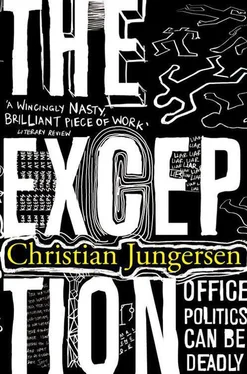Christian Jungersen - The Exception
Здесь есть возможность читать онлайн «Christian Jungersen - The Exception» весь текст электронной книги совершенно бесплатно (целиком полную версию без сокращений). В некоторых случаях можно слушать аудио, скачать через торрент в формате fb2 и присутствует краткое содержание. Год выпуска: 2010, Издательство: Orion Books, Жанр: Современная проза, Триллер, на английском языке. Описание произведения, (предисловие) а так же отзывы посетителей доступны на портале библиотеки ЛибКат.
- Название:The Exception
- Автор:
- Издательство:Orion Books
- Жанр:
- Год:2010
- ISBN:нет данных
- Рейтинг книги:3 / 5. Голосов: 1
-
Избранное:Добавить в избранное
- Отзывы:
-
Ваша оценка:
- 60
- 1
- 2
- 3
- 4
- 5
The Exception: краткое содержание, описание и аннотация
Предлагаем к чтению аннотацию, описание, краткое содержание или предисловие (зависит от того, что написал сам автор книги «The Exception»). Если вы не нашли необходимую информацию о книге — напишите в комментариях, мы постараемся отыскать её.
The Exception — читать онлайн бесплатно полную книгу (весь текст) целиком
Ниже представлен текст книги, разбитый по страницам. Система сохранения места последней прочитанной страницы, позволяет с удобством читать онлайн бесплатно книгу «The Exception», без необходимости каждый раз заново искать на чём Вы остановились. Поставьте закладку, и сможете в любой момент перейти на страницу, на которой закончили чтение.
Интервал:
Закладка:
Once Iben spoke out. ‘It isn’t fair to keep going out with Gunnar and letting him pay for one meal after another. He’s in love with you and you don’t even want to sleep with him.’
‘Oh, come on. We always have such a good time together. And he’s said that he isn’t expecting anything more — you know, like love or sex.’
‘But he’s got to pay for you all the same?’
‘No, it’s not like that. It’s simple: he enjoys eating in restaurants and so do I, but I’m broke. If he couldn’t afford it and I could, I’d pay for him.’
When Malene met the younger, cooler Rasmus and became his girlfriend, he too tried to stop her evenings out with Gunnar. Iben overheard Malene say, ‘Rasmus, there’s nothing sexual between Gunnar and me. We’re just good friends.’ Still, Rasmus had insisted that she should pay her share.
Before leaving, Iben and Malene wolf down some leftovers and empty their Mojito glasses. In the hall, Malene quickly changes to another pair of her expensive orthopaedic shoes, which she has to wear because of her arthritis.
Iben and Malene hang up their coats in the narrow passage of Sophie’s flat. The air is heavy with the smell of fried food, wine and people.
Sophie comes over to meet them. After the hugs and cries of ‘So good to see you’, she notices Malene’s clothes and make-up. ‘But Malene, it’s not that kind of party …’ Some of her other guests are drifting out through the sitting-room door and bump into her. Distractedly she finishes the sentence: ‘… it’s just, you know, the same old crowd coming round for a drink. You know I’m off tomorrow, don’t you?’
When she phoned up about the party, Sophie, who had lived in the same student housing as Iben and Malene, explained that she was leaving Denmark to join her boyfriend, a biologist working in Canada on a two-year project.
Someone in the sitting room calls out: ‘Hey, look, there’s Iben. The heroine has arrived!’
‘Went back to protect the others, instead of just looking after number one,’ another old college friend adds.
Iben smiles. God only knows how many times she’s explained it all before. ‘I had no idea what I was doing. Everything was so confusing. I just didn’t think about the outcome.’
‘But that’s precisely what makes what you did heroic, Iben. You had the right instincts. Or whatever it is that kicks in when you’ve got to make a split-second decision.’
Sophie gives Iben another little hug and looks her in the eye. ‘Most people would have run for it.’
The sitting room is packed with familiar faces. Five years ago they were all students together, in their early twenties. Iben remembers how they would laze around on the grass in Fælled Park when there was a concert on. Almost all of them have finished with education by now. Some have jobs, but many more live on benefits, full or part-time. Despite failing in the job market they still feel less poor now, because the unemployment payments are quite an improvement on student grants. Individual lives are being pushed in utterly unforeseen directions along career paths, sometimes along straight routes and sometimes up blind alleys. Some of them already have children.
They are everywhere, standing or sitting, drinking beer or red wine, chatting in the low light from a few dim lamps. Three young mothers drift around with babies in their arms. Iben and Malene exchange glances. Obviously, dancing isn’t an option.
There are more questions about Nairobi, but Iben only smiles. ‘I’ve been asked about all that so often I can’t even bring myself to discuss it any longer. Some other time. Look, what about you?’
She does the rounds of the room and then tucks herself away in a corner where she can half-sit, half-lean on a table. A man starts reminiscing about nights spent clubbing. He’s a dentist, fresh from his qualifying exams and already well on his way to becoming an alcoholic.
She looks up and, across the room, sees Gunnar. Malene once spoke of him as ‘such a big guy’ and Iben got the impression that he was John Goodman-sized. Now she realises that he is more like the young Gérard Depardieu.
Iben sees Malene get up from an inflatable armchair and walk towards Gunnar; the dentist turns to watch.
Iben crushes a crisp between her teeth. Some women, she thinks, would be bloody irritated if their friend had that sort of effect on every single guy they met. She observes Malene lead Gunnar away to the relative peace of the hallway.
Later, Iben and one of Rasmus’s best friends end up side by side on the sofa. He wears a neon-blue jacket with contrasting seams and is proudly telling her that he’s just landed a job as a copywriter in an advertising agency. His voice sounds louder than it used to be and his laughter seems more mechanical.
‘Human rights and art — great stuff, but there’s no money in it!’
He sees the expression on Iben’s face. ‘Sure, it’s not so bad being more or less broke. But unemployment, that’s something else. It’s awful. I mean, just look at the way you’re treated by your prospective employers. They couldn’t give a fuck. They know perfectly well they can take their pick from thousands of graduates.’ Some of the people standing nearby are listening in and he turns to them as well. ‘But in a good agency you get treated differently. The bosses know how few there are who have both the talent and the stamina to put up with that line of work.’ He smiles. ‘Like, watch the style; fuck the substance.’
He mentions the name of his agency and Iben is obviously meant to recognise it. ‘We’ve been on TV. Like you.’
Iben pours fruit juice into her plastic cup while keeping an eye on Gunnar, who has come back into the room. He isn’t surrounded by any female admirers. Maybe because by now they’re old enough to feel self-conscious or because they think that, in the flesh, he doesn’t quite live up to their fantasies. Or maybe because he is just too old.
Rasmus’s friend is still working his story. Now he’s telling everyone about how his agency paid for him and the rest of the crew to take a three-day Christmas break, partying in Barcelona, and how it was worth it, given the firm’s investment in their salaries.
Maybe it’s the impressed looks on the faces of the listeners that prompts Iben to jump in and defend traditional values, such as ‘Money isn’t everything’ and ‘You can’t buy happiness’. In no time she realises that this discussion is just a rerun of their old debates, as if they are all battle-worn politicians in the last days of an election campaign, able to predict their opponents’ arguments.
Avoiding eye contact, she deliberately turns away from the discussion and tries instead to eavesdrop on the conversation of the two strangers sitting opposite.
But Rasmus’s friend hasn’t finished. ‘Iben, your job is different. I would’ve liked it myself. You investigate serious stuff. Humanitarian issues. That’s really worthwhile. It means something.’ He pats his bright-blue jacket. ‘You try to make the world a better place, sure. But I’m not convinced that will ever happen. It’s not top of the agenda.’ He breaks off, apparently amused by his own paradox.
Later, Iben finds herself standing next to a child’s folding cot, all aluminium and nylon, like a tiny piece of camping equipment. She is balancing a glass of red wine and three broken crackers.
Suddenly Gunnar materialises at her side. ‘What’s it like to be back home?’ That calm voice of his.
She looks at him. He has grey-blue eyes. ‘I’m not sure if I am back.’
They laugh.
Iben doesn’t know where to look. Sophie has put on one of her Buddha Bar CDs. At the other end of the room Malene walks over to a wooden chair and sits down. Only Iben knows exactly how Malene looks when her feet begin to hurt. She will want to go home soon.
Читать дальшеИнтервал:
Закладка:
Похожие книги на «The Exception»
Представляем Вашему вниманию похожие книги на «The Exception» списком для выбора. Мы отобрали схожую по названию и смыслу литературу в надежде предоставить читателям больше вариантов отыскать новые, интересные, ещё непрочитанные произведения.
Обсуждение, отзывы о книге «The Exception» и просто собственные мнения читателей. Оставьте ваши комментарии, напишите, что Вы думаете о произведении, его смысле или главных героях. Укажите что конкретно понравилось, а что нет, и почему Вы так считаете.












